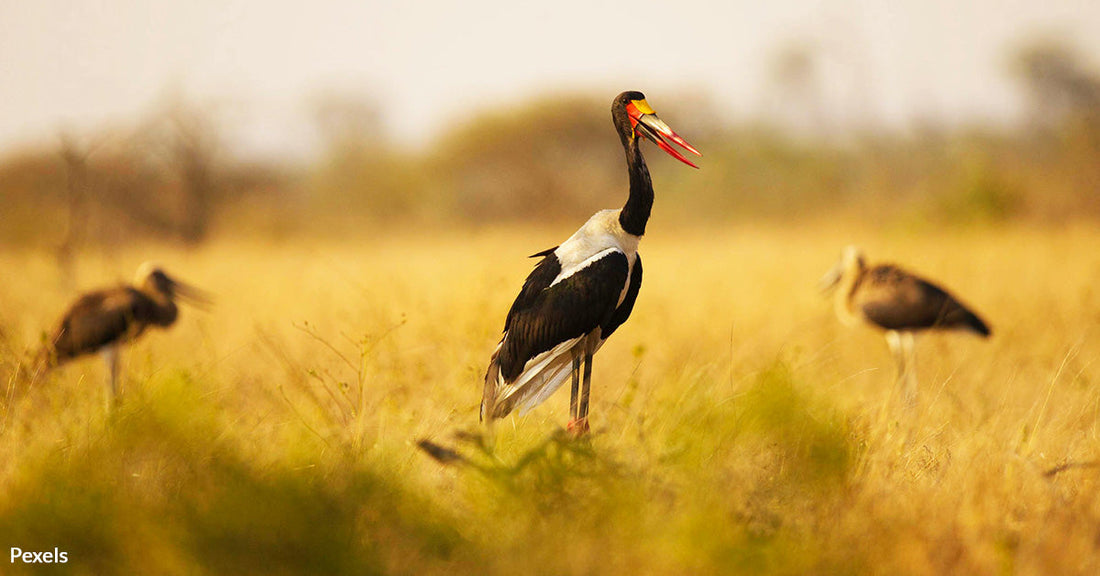South African Wildlife Heroes Use Puppet Birds to Teach Orphaned Cranes How to Survive
Matthew Russell
In the heart of South Africa, a wildlife rehabilitation center is tackling a critical problem: how to raise orphaned birds without causing human dependency. FreeMe Wildlife Midlands Centre has found a solution by using costumes and puppets to teach survival skills to critically endangered wattled crane chicks. Their innovative approach is helping these vulnerable birds develop natural instincts, free from human imprinting, and preparing them for a return to the wild.

Photo: Pexels
Wildlife rehab workers are dressing as cranes to teach orphaned chicks vital survival skills.
Costumes That Save Lives
Raising baby birds without imprinting on humans is no easy task. Young birds learn essential skills from their parents, like how to forage and drink from ponds. Without their mothers, orphaned chicks are at risk of losing these instincts, which can make survival in the wild nearly impossible. The challenge lies in teaching these skills without creating human attachment. At FreeMe Wildlife, the solution is simple yet ingenious: workers wear crane costumes and use puppets to model bird behaviors.
One worker, Siya Nyawo, dons a crane costume and uses a puppet named Waldo to demonstrate drinking from a pond. The puppet, attached to Nyawo’s arm, mimics an adult crane’s movements as it dips its beak into the water. As Upworthy reports, this allows the chick to learn without forming a bond with the human behind the puppet. Nyawo carefully mimics the natural motions of an adult wattled crane, guiding the young bird while remaining hidden behind the costume. The goal is to build confidence and self-sufficiency while avoiding any hint of human dependency.

Photo: Pexels
Orphaned cranes risk losing instincts without their mothers.
A Hands-Off Philosophy
FreeMe Wildlife has a strict hands-off policy, which they believe is essential for successful rehabilitation. Allowing wildlife to develop natural behaviors without human interference is crucial.
“If one does not intimately understand the physiology, the ethology, and the psychology of one's subject, one cannot successfully rehabilitate it,” the center posted to social media.
As his hands-off approach is a core value at FreeMe Wildlife. The center, founded in 2007 by Adel Malan, has grown to become one of the most respected wildlife rehab facilities in South Africa. With over 2,000 patients admitted annually, it is a vital resource for rescuing and rehabilitating indigenous wildlife, including many threatened and endangered species.

Photo: Pexels
Raising orphaned birds without human imprinting is crucial for their survival.
Innovative Techniques, Proven Success
The use of puppets and costumes to raise birds without imprinting is not unique to FreeMe Wildlife. Similar techniques have been used to rehabilitate critically endangered California condors at the San Diego Zoo, where puppets were essential in preventing imprinting and ensuring the birds could thrive once released, Upworthy reports. By mimicking natural behaviors without human contact, the zoo successfully helped rebound condor populations from the brink of extinction.
The strategy at FreeMe Wildlife is part of a growing movement to find creative solutions for wildlife rehabilitation. In one instance, baby pigeons were taught to peck seeds by playing YouTube videos of birds eating. Another method involved using a puppet head and neck to simulate feeding, helping the chicks understand how to forage independently, The Cool Down reports.

Photo: Pexels
Wildlife experts use precise movements to teach foraging without human interaction.
The Bigger Picture
The work at FreeMe Wildlife is not limited to birds. The center is part of the global “One Health” initiative, which recognizes the interconnected health of people, animals, and the environment. By focusing on wildlife rehabilitation with minimal human contact, FreeMe Wildlife helps restore ecological balance and contributes to conservation efforts across Southern Africa.
In 2019, FreeMe Wildlife led one of South Africa’s largest species rescue efforts after a hailstorm destroyed roost sites, leaving more than 2,000 Amur Falcons injured or displaced, the sanctuary reports. Through meticulous care and rehabilitation, all the birds were successfully released.
Inspiring a New Generation of Conservationists
The success of FreeMe Wildlife is rooted in its dedication to conservation and education. By employing innovative techniques and upholding the highest ethical standards, the center serves as a model for wildlife rehabilitation worldwide. Their work demonstrates that with ingenuity and commitment, humans can help restore nature’s balance without disrupting wildlife’s natural instincts.
For many animals, the difference between life and death hinges on subtle yet profound interventions. As Nyawo and his colleagues continue to don their crane costumes, they remind us that sometimes, it takes a bit of creativity to give endangered birds a fighting chance at survival.

